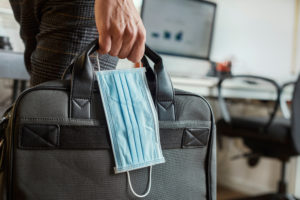The Coronavirus (COVID-19) has changed all our lives in an instant. Normal has come to a screeching halt. Many people are not working, and some people are working from home. People are no longer eating in restaurants; children are not in school or college and malls and shopping centers are closed. But worst of all people are dying. The city of Detroit currently has the 3rd highest number of people in the United States who have tested positive for the coronavirus[1] behind New York and Chicago. The Michigan governor issued an executive order[2] on March 23, 2020 to go into effect on March 24, 2020 until April 13, 2020 ordering people to stay home and stay safe unless their employment is deemed critical to infrastructure or unless they are outside their home for essentials like groceries, food, medications, health care, gasoline or to get some fresh air by walking or hiking.
Many businesses and employees are confused as to whether they are considered essential. The following have been deemed essential: Healthcare/Public Health, Food and Agriculture, Water and Wastewater, Public Works, other Community -Based Government Operations and Essential Functions, Critical Manufacturing, Hazardous Materials, Financial Services, Defense Industrial Base, Chemical, Law Enforcement, Public Safety, First Responders, Energy, Transportation and Logistics, and Communications and Information Technology.[3] Essential is something that is necessary to sustain or protect life, part of critical infrastructure workforce.
People have expressed concern with being out of their home and being approached by or pulled over by police and asked where they’re going. Some people have even said they themselves or people they know have been pulled over for no reason and questioned or even given a citation for violating the Governor’s executive order, EO 2020-21. A violation of the order, Michigan Compiled Laws (MCL) 10.33, is a misdemeanor punishable by up to 90 days in jail and/or a $500 fine. The charging language for this offense is as follows:
_______________did violate the orders, rules and regulations promulgated by the Governor of the State of Michigan after the declaration of a state of emergency on (1) date of declaration, as provided by MCL 10.31, more specifically, by doing an act contrary to said orders, rules, or regulations, to wit: (2)description of prohibited act; contrary to MCL 10.33.
The purpose of the executive order is to keep people safe, healthy and separated from other people. Although normal life is interrupted, the goal is to keep us safe in the midst of this pandemic. Most police agencies have said they’re not going to just be pulling citizens over to see where they’re going[4]. Pulling over a citizen would cause a law enforcement officer to have contact with a citizen, and the less person to person contact the better we’ll all be in fighting this pandemic. Some legal minds have said that police officers must have some legitimate reason to pull someone over, like a traffic code violation, before they can ask questions to see if a citizen is traveling somewhere that is in compliance with the Governor’s order. Other legal minds have said police officers who pull a driver over to see if the person is outside for a legitimate reason is a legitimate reason to pull a person over and refer to states like North Carolina[5], Louisiana, New York and Florida that have checkpoints to check to see if a person lives in the county they’re trying to enter or to check to see if a person(s) is fleeing from states like New York or Louisiana that have been heavily hit with the coronavirus (COVID-19) to another state. This experience is something new for all of us. Getting pulled over by the police only for the police to see where one is going and if it is in compliance with the Governor’s executive order would seem to depend on the circumstances. Given the extent of this pandemic and the likelihood that many of the nation’s hospitals are already overwhelmed with treating coronavirus patients, a traffic stop or a check point to verify where one is going and if it is in compliance with the stay home order, might seem like a legitimate law enforcement contact to help ensure the health and safety for all of us. Many law enforcement agencies have said if they do pull someone over and the person’s reason for being out is not within the scope of the Governor’s order, their goal is not to just cite people with violating the stay at home order, but to educate people so that they understand the importance of the order and that the order is to keep us apart from one another to stop the spread of the virus and to request people to end the conduct that is in violation of the Governor’s executive order. Michigan’s attorney general has stated in an opinion that a police officer is not legally allowed to pull someone over for a traffic stop simply because they think the driver is violating the governor’s order because they’re out and not at home. Driving doesn’t constitute probable cause for a traffic stop.
People are extremely concerned about their loved ones or friends who are incarcerated for a pending criminal case during this pandemic. Some jails have allowed the early release of low-level offenders to help prevent the spread of the virus[6]. For those who aren’t released from jail and remain incarcerated most jails provide a way for people to communicate with incarcerated loved ones and friends by phone or by video. Securus is a company that provides such a service to the public and inmates. This service can be signed up for online and does carry a cost. Sign up can be done at Securustech.online.
Although the courts are closed to the public, the courts are still having hearings only for essential functions[7]. I, in fact, have court next week. I am concerned about being in court, because just being around people is how the coronavirus spreads. Most court cases, even for those who are incarcerated, are being adjourned. But there are some hearings, like probable cause conferences or preliminary examinations that must proceed for incarcerated persons and courts are open to handle those matters. Per orders of the Supreme Court, attorneys are allowed to be in court with their clients, but trial courts have been ordered to limit access to courtrooms and other spaces to no more than 10 persons including court staff and to practice social distancing.
Attorneys are still working just in a different way, we’re in-house counsel (I had to lighten it up with a lawyer joke…lol) – working remotely from home. I have been working remotely since the Governor’s executive order went into effect and have received multiple calls from people who are thinking about estate planning for the first time. People are concerned with how quickly some pass on after becoming ill from the coronavirus (COVID-19) and want to put things in order for their spouse, children and other family members in case they succumb to the coronavirus. Other people have said they never really thought about estate planning or always put it off as something they could do later. People want to have estate planning in place given this health pandemic and have time to reach out to an attorney to have a will and or a trust done because they are home and have time to contact an attorney.
Stay home and stay safe orders and social distancing guidelines are to save lives. During this time, or whenever one has a feeling of great anxiety and stress, it’s very important to seek mental health treatment if you’re having a really difficult time dealing with the coronavirus (COVID-19) pandemic or just need to talk to someone. There are several mental health counselors who provide secure online therapy sessions. Additionally, relying on faith, daily positive readings or saying positive affirmations, staying in touch with loved ones and friends by phone, FaceTime or other online video or conferencing applications and limiting social media and news media, working from home, if possible, and maintaining some level of a routine are important measures to utilize during this pandemic to help remain calm and less stressed.
The coronavirus has impacted every area of our world including the judicial system. But be strong. It may be stormy now, but it won’t rain forever. Only in the darkness can you see the stars[8]. This too shall pass. Most importantly stay safe and healthy.
If you’ve been cited for a violation of the Governor’s order or want to prepare an estate plan , please don’t hesitate to give us a call at 888-227-4770. Our criminal defense and estate planning attorneys are ready to fight for your rights and assist you.
[1] https://www.bridgemi.com/michigan-health-watch/coronavirus-tracker-what-michigan-needs-know-now
[2] https://www.michigan.gov/whitmer/0,9309,7-387-90499_90705-522626–,00.html
[3] https://www.michigan.gov/ag/0,4534,7-359-98784—,00.html
[4] https://wsbt.com/news/local/how-will-michigans-stay-at-home-order-be-enforced
[5] https://www.cnn.com/2020/03/29/us/dare-county-north-carolina-state-of-emergency-trnd/index.html
[6] https://www.lansingstatejournal.com/story/news/2020/03/20/coronavirus-inmates-released-ingham-clinton-county-jails/2884348001/
[7] https://courts.michigan.gov/Courts/MichiganSupremeCourt/rules/court-rules-admin-matters/Administrative%20Orders/2020-08_2020-03-18_FormattedOrder_AO2020-2.pdf
[8] Dr. Martin Luther King, Jr.

Ayanna D. Neal joined Grewal Law PLLC as an attorney after dedicating fifteen years to representing the people of the state of Michigan in prosecution for Ingham County Prosecutor’s Office. Ayanna began practicing law two years prior to working as a prosecutor and handled child custody, contracts, and estate planning cases. Ayanna is a licensed domestic relations mediator and holds a Bachelor of Arts in Political Science from the University of Michigan and Juris Doctor with a concentration in Business Transactions from Thomas M. Cooley Law School.














Comments for this article are closed.